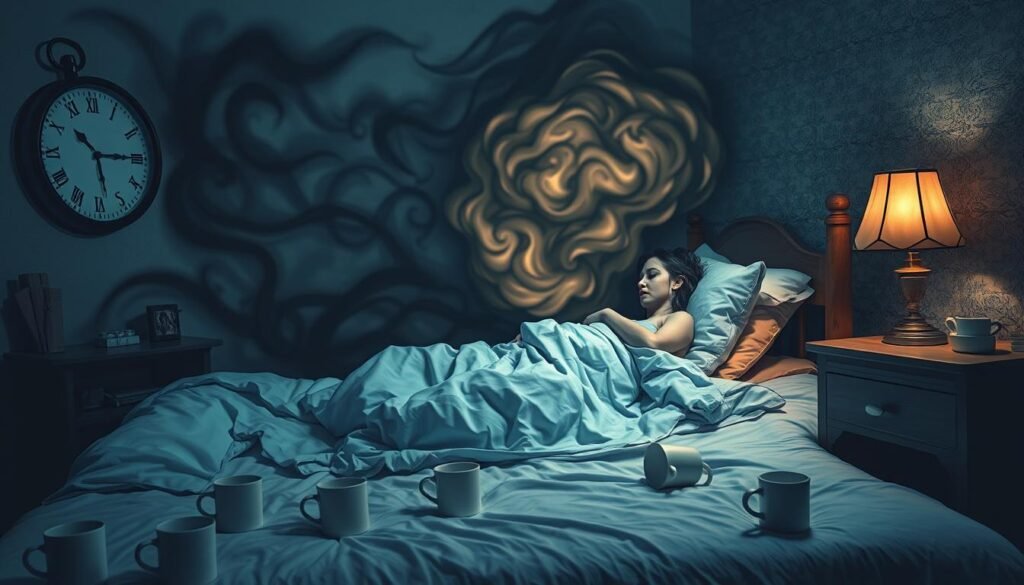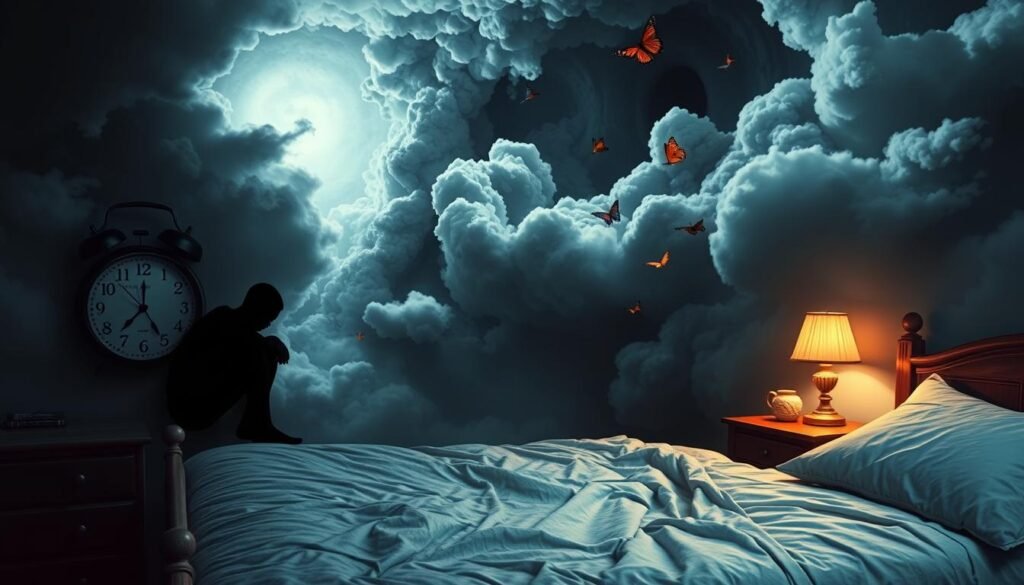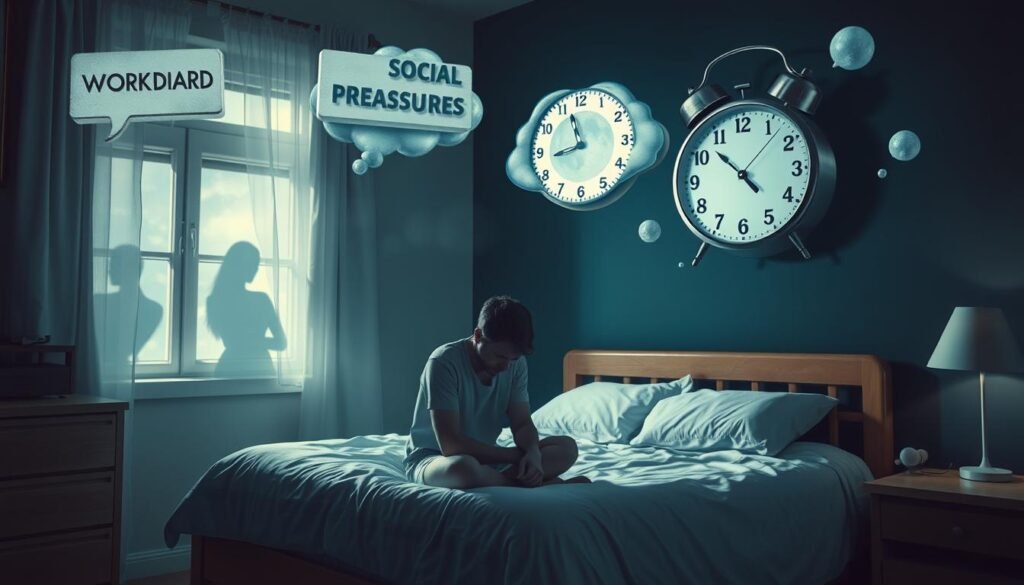Did you know that about 40% of people with anxiety issues also have trouble sleeping? The American Academy of Sleep Medicine has shown that not getting enough sleep can cause serious health problems. These include heart disease, being overweight, diabetes, and even feeling very sad. Sleep anxiety, which is when you’re scared of falling asleep, can make stress and not sleeping well worse. This guide will talk about what sleep anxiety is, how to spot it, why it happens, and how to deal with it. We’ll cover stress management and how talking to a therapist can help.
Key Takeaways
- Understanding sleep anxiety is crucial for addressing sleep issues effectively.
- Common signs include physical and mental symptoms such as racing thoughts and physical restlessness.
- Life stressors and traumatic experiences often contribute to sleep anxiety.
- Implementing good sleep hygiene can alleviate symptoms associated with sleep anxiety.
- Cognitive behavioral therapy has proven highly effective in treating sleep anxiety and insomnia.
- Sleep deprivation significantly impacts mental health and exacerbates anxiety disorders.
- Seeking professional help is essential for persistent sleep-related anxiety.
Understanding Sleep Anxiety
Understanding sleep anxiety is crucial for those facing this tough situation. Many feel a strong sense of dread as bedtime nears. This feeling creates a cycle where anxiety disorders lead to serious sleep issues, making sleep quality worse. Around 24% to 36% of people with nighttime problems also deal with anxiety disorders. Knowing this link helps people find the right coping methods.
People with panic disorder are three times more likely to have sleep problems. Up to 20% to 45% of them may have panic attacks at night. This makes it hard to relax and sleep again. Because of this, insomnia is common in those with anxiety disorders, affecting their daily life and well-being.
Having a regular sleep schedule can better sleep quality and lessen anxiety symptoms. Cognitive behavioral therapy (CBT) and exercise have been proven to help. They can improve sleep patterns and reduce the time it takes to fall asleep, which helps lower anxiety levels.
To deal with sleep issues, good sleep hygiene is important. Bad habits, like using electronics before bed, can delay sleep and worsen anxiety. Understanding the link between anxiety and sleep problems is key. It leads to better habits and seeking professional help when needed. For more tips, check out this source. This promotes making smart health choices and taking charge of your well-being.
What is Sleep Anxiety?
It’s important to know what sleep anxiety is and how it affects us. Sleep anxiety is the worry we feel about getting good sleep. It usually comes with other anxiety issues and insomnia. People with sleep anxiety often find bedtime stressful due to fear.
Some people feel physical signs like a fast heartbeat or stiff muscles when trying to sleep. These signs can make the fear of sleeping worse, making it hard to relax. According to the Sleep Anxiety Definition, this problem can come from long-term insomnia. This is when you can’t sleep well for many months, increasing the chance of having anxiety.
Physical causes also play a role in sleep anxiety. Not sleeping well can seriously affect mental health. It can lead to more anxiety and even panic attacks. Worrying about sleep-related health issues, like sleep apnea, adds to the stress. This makes people avoid sleep, which only makes sleep issues worse.
In short, sleep anxiety is affected by both our minds and bodies. Understanding sleep anxiety helps people seek the right help. This can lead to better sleep and less anxiety.
Signs and Symptoms of Sleep Anxiety
Sleep anxiety shows signs that affect both mind and body. Knowing these signs is the first step to getting better. It leads to finding the right support.
Physical Signs
Physical symptoms are a big part of sleep anxiety. Common signs include:
- Headaches
- Muscle tension
- Rapid heartbeat
- Restlessness
- Sweating
- Shortness of breath
Having these symptoms can make life hard. They cause a lot of discomfort and make it tough to sleep well.
Mental Signs
Mind issues are also a big problem with sleep anxiety. People might deal with:
- Racing thoughts
- Flashbacks of traumatic events
- Worries about the future
- Frequent nightmares
These Mental Symptoms of Anxiety disturb sleep a lot. They don’t just affect sleep but make anxiety worse.

Knowing the Signs and Symptoms of Sleep Anxiety helps people seek the right advice. This can greatly improve someone’s life.
| Type | Examples |
|---|---|
| Physical Symptoms | Headaches, Rapid Heartbeat, Muscle Tension |
| Mental Symptoms | Racing Thoughts, Nightmares, Flashbacks |
The Link Between Sleep Anxiety and Insomnia
The relationship between anxiety and sleep is complex. Many with Sleep Anxiety and Insomnia find a clear link between their worries and sleep quality. High anxiety levels can lead to hyperarousal, making it tough to relax and sleep.
Research shows a trend: those with anxiety-induced insomnia have trouble staying asleep. They tend to sleep less. This results in feeling tired during the day and can lead to errors.

Chronic insomnia can lower well-being by raising cortisol, a stress hormone. Over time, poor sleep may boost the risk of mental health issues, like depression. Studies suggest that not enough sleep can make negative feelings worse. But enough sleep can help control mood and anxiety.
There are effective treatments for both insomnia and anxiety. Cognitive Behavioral Therapy (CBT) is especially helpful. It works on changing behaviors that disturb sleep and managing worries. Doctors may also suggest medicines based on one’s health history and insomnia reasons. Knowing the link between Sleep Anxiety and Insomnia is key for seeking help.
Common Causes of Sleep Anxiety
Knowing why people feel anxious about sleep is crucial for helping them. Causes of sleep anxiety include genetics and anxiety. If anxiety disorders run in the family, someone might have a higher chance of sleep anxiety. Also, looking at a person’s mental health history helps us understand their current situation.
Genetics and Family History
Studies show that genes play a role in anxiety disorders. People with a family history of these issues are more likely to have sleep anxiety. This shows how genetics and anxiety influence someone’s sleep. When diagnosing sleep problems, doctors often look at family health. Genetics greatly impact both mental well-being and how well we sleep.
Stress and Traumatic Experiences
Stress and trauma can lead to sleep anxiety. Those facing constant stress or trauma might struggle with their sleep. This struggle can increase anxiety. Losing a loved one, job problems, or big life changes are examples. These experiences can change sleep patterns for a long time. Facing these stressors often may make sleep problems worse. For tips on handling these issues, check out this resource.

Impact of Sleep Deprivation on Mental Health
Not getting enough sleep can really affect your mental health. It can make issues like anxiety disorders and depression worse. A big study of 154 studies over 50 years found that not sleeping well makes us feel less happy and content. People who don’t sleep enough feel more anxious and worried.
Even missing a little bit of sleep, like an hour or two, can have bad effects. It’s clear that not sleeping enough is bad for our mental health. While not sleeping well makes feelings of sadness a bit less intense, the negative effects on anxiety and how we feel overall are big.
Over 30% of adults and almost 90% of teenagers don’t get enough sleep. This shortage of sleep is a big problem today. It doesn’t just affect the person; it affects work and increases healthcare costs. The US loses about $65 billion because of this in productivity and healthcare costs.
It’s crucial for certain jobs, like first responders and pilots, to focus on getting enough sleep. Science-based sleep rules can lower risks and help people feel and function better during the day. For more on this topic, visit this article.
| Statistic | Value |
|---|---|
| Adults lacking adequate sleep | 30% |
| Teenagers lacking adequate sleep | 90% |
| Estimated healthcare costs due to sleep deprivation | $65 billion |
| People reporting sleep deprivation in the U.S. | 70 million |
| Prevalence of primary insomnia | 30-35% |
| Productive healthy life lost worldwide due to primary insomnia | 3.6 million years |
Coping Strategies for Sleep Anxiety
Dealing with sleep anxiety means changing habits and finding effective methods. It’s important to work on sleep cleanliness and relaxation ways. Good sleep hygiene is crucial for a sleep-friendly setting.
Sleep Hygiene Practices
Using Sleep Hygiene Tips can change everything. It helps to have a fixed bedtime and aim for 7 to 9 hours of sleep. Also, make sure your sleeping space is inviting by:
- Keeping the bedroom dark, cool, and quiet.
- Limiting screen time before bed.
- Steering clear of caffeine and nicotine at night.
A good set-up, alongside these tips, helps tackle sleep anxiety. If problems stay, it’s a good idea to see a doctor for more help on sleep anxiety.
Relaxation Techniques
Adding Relaxation Techniques for Anxiety to your bedtime routine can be soothing. Meditation, soft breathing, and muscle relaxation can help. Spending 20 to 25 minutes on these can cut stress a lot.
Yoga and tai chi also help lessen stress hormone levels. If you’re awake for more than 20 minutes at night, try doing something calming instead of trying to sleep by force.
Effective Treatments for Sleep Anxiety
Treatments for sleep anxiety focus on tackling the root causes, not just the symptoms. They often combine Cognitive Behavioral Therapy (CBT) with lifestyle changes. This approach is tailored to meet individual needs.
Cognitive Behavioral Therapy (CBT)
Cognitive Behavioral Therapy is recommended for long-term sleep issues like insomnia. It teaches people to change negative thoughts about sleep. Studies show CBT benefits anyone with sleep problems.
CBT has no harmful side effects and offers lasting solutions. Most people need 6 to 8 sessions. It targets the root causes of sleep anxiety, making it very effective.
Lifestyle Changes and Medication
Making lifestyle changes improves sleep quality and reduces anxiety. Activities like regular exercise, eating well, and avoiding large meals before bed are key. Avoiding too much caffeine and smoking is also crucial.
While sleep meds can help short-term, they might not address the main problem. They can also lead to dependence or other issues. It’s important to talk with a healthcare provider for a full treatment plan.
Conclusion
Sleep anxiety is closely linked to mental health, making it harder to sleep well. Studies show that many with mental health issues have trouble sleeping. This highlights why understanding sleep anxiety is so important.
Getting professional help is crucial. Doctors can offer methods to tackle these problems. Using good sleep habits and relaxation methods can really help improve sleep. This not only makes sleep better but also boosts overall health.
Knowing that sleep anxiety is common can be comforting. It encourages people to manage their sleep better. By recognizing the signs, understanding the reasons, and finding good treatments, they can improve their sleep and mental health. This helps in handling sleep problems more successfully.